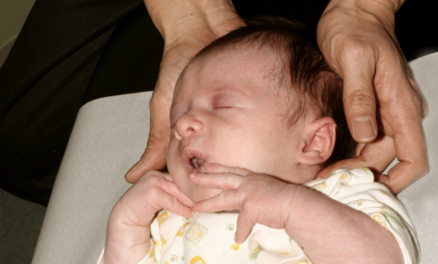 Many spinal problems seen in adults began as early as birth. Even so called “natural” birthing methods can stress an infant’s spine and developing nerve system. The resulting irritation to the nerve system caused by spinal and cranial misalignment can be the cause of many newborn health complaints. Colic, breathing problems, nursing difficulties, sleep disturbances, allergic reactions and chronic infections can sometimes be traced to nerve system stress.
Many spinal problems seen in adults began as early as birth. Even so called “natural” birthing methods can stress an infant’s spine and developing nerve system. The resulting irritation to the nerve system caused by spinal and cranial misalignment can be the cause of many newborn health complaints. Colic, breathing problems, nursing difficulties, sleep disturbances, allergic reactions and chronic infections can sometimes be traced to nerve system stress.
Since significant spinal trauma can occur at birth, many parents have their newborns checked right away. As the infant grows, learning to hold up the head, sit, crawl and walk are all activities that affect spinal alignment and are important times to have a child checked by a Doctor of Chiropractic.
It is important to understand that the Doctor of Chiropractic utilizes a natural approach toward infant health. The expertise of the chiropractor is in checking the child’s spine for misalignments that impair nervous system function, therefore affecting overall body function.
The doctor of chiropractic will take a case history and perform a chiropractic exam to determine if spinal subluxations exist. Chiropractic adjusting procedures are modified to fit a child’s size, weight, and unique spinal condition. They are both gentle and specific to the child’s developing spinal structures. Most parents report that their children enjoy their chiropractic adjustments and look forward to subsequent visits. They also report that their children experience a greater level of health while under regular chiropractic care.
Chiropractic care for children offers your family a solid foundation for wellness. Throughout pregnancy, birth, and childhood, the chiropractic lifestyle offers choices and benefits for your greater health and well-being.
People of all ages are candidates for chiropractic treatment. Even babies can have subluxations, due to the rigors of birth. In general, it’s best to treat children’s subluxations early, as they interfere with nerves that control developing muscles and organs. With an early checkup, your chiropractor can detect these problems while they are easy to correct.
Proper posture begins while babies are developing. If there is not enough room for the baby to move around (intrauterine constraint), then the nervous system may be affected, which controls posture. This constraint can occur from misalignment of the mother’s pelvic bones or lower spine. Regular chiropractic spinal checkups during pregnancy can detect and eliminate any restrictions to the baby’s development. Birth trauma can also influence the baby’s future posture. Even the most natural, uneventful birth can cause stress to the small bones in a baby’s spine, especially the neck. If you had a cesarean section, or forceps, vacuum, or a doctor’s hands were used to birth your baby, then the chances your baby’s spine was affected increase. Getting your children’s spines examined by a pediatric chiropractor as soon after birth as possible can prevent spinal problems occurring in the future, which might affect posture.
 A chiropractic treatment plan featuring gentle adjustments appropriate for very young children offers hope for comforting relief – without recourse to heavy use of antibiotics or surgery. Chiropractic upper-spine adjustments and massage of the tissue surrounding the ear can help clear the Eustachian tube blockage that causes otitis media. Dietary/nutritional guidance (such as testing for food sensitivities and vitamin deficiencies) may also be offered. The chiropractic approach is an alternative to traditional medical treatments. Chiropractic is a very effective and safe approach to chronic ear infections.
A chiropractic treatment plan featuring gentle adjustments appropriate for very young children offers hope for comforting relief – without recourse to heavy use of antibiotics or surgery. Chiropractic upper-spine adjustments and massage of the tissue surrounding the ear can help clear the Eustachian tube blockage that causes otitis media. Dietary/nutritional guidance (such as testing for food sensitivities and vitamin deficiencies) may also be offered. The chiropractic approach is an alternative to traditional medical treatments. Chiropractic is a very effective and safe approach to chronic ear infections.
The most common symptom of colic is “excessive crying” (more hours of crying and more stretches of crying per day than non-symptomatic children). The crying may also have a higher frequency/pitch than normal babies. Other possible symptoms include motor unrest (flexing of the knees against the abdomen, clenching of the fists, and extension or straightening of the trunk, legs and arms). For years, chiropractors have cared for children with colic symptoms, and with good results. In fact, the benefit of chiropractic for managing infantile colic was clearly illustrated in a recent study that compared the short-term effects of spinal manipulation vs. drug intervention (a drug called “dimethicone”). Results not only showed that chiropractic adjustments were effective in reducing colic symptoms, most notably the average hours per day spent crying, but also that the use of drugs was not particularly effective, and certainly less effective than chiropractic care. Your doctor of chiropractic can evaluate your child’s condition and recommend the best approach for maximizing health and wellness.